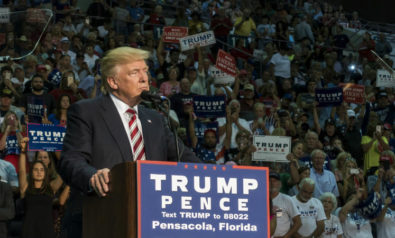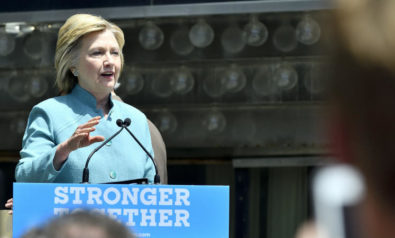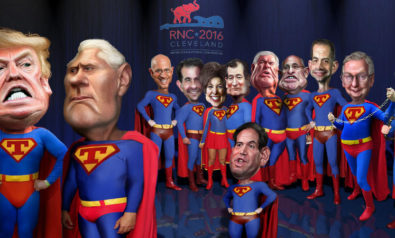No amount of semantic somersaulting can whitewash the racist overtones of Donald Trump’s campaign.
The 55 million Latinos in the United States embody diversity. We come from African, European, Asian and indigenous backgrounds. We represent every shade of skin, eye and hair color. We are Catholic, Protestant, Muslim and Jewish. We run the political spectrum from conservative to liberal.
Our diversity is worth celebrating, which makes this article at once difficult and necessary to write. Difficult because Latinos, like all Americans, have the right to support the politicians who best represent their beliefs. Necessary because personal ideology must arise from thoughtful introspection, not from the unconscious effects of racism.
And, as difficult as it may be to accept, a Latino Donald Trump supporter is a textbook example of internalized oppression.
Latinos and Internalized Oppression
Internalized oppression is a complex process founded in repeated exposure to racism and discrimination. The internalization of these negative experiences can create patterns of “self-invalidation, self-doubt [and] fear” among minorities and lead them to believe and act out the stereotypes to which they have been exposed.
What’s worse, the unconscious self-hatred associated with internalized oppression often leads minorities to criticize each other in much the same way that they themselves are put down in the first place. For Latinos, this means blaming fellow Hispanics for stealing jobs or abusing social welfare.
Take, for instance, A.J. Delgado, a conservative Hispanic columnist and attorney. In a radio interview during the Republican National Convention (RNC), Delgado reiterated the narrative that Latinos “don’t want to have to compete with illegal immigrants for our jobs,” a claim that is demonstrably false. In the interview, she claims to speak for all Hispanics.
I am the son of Colombian immigrants and, like many other Latinos, I do not fear competing with undocumented workers for jobs—and, to be fair, as a columnist and attorney, neither does Delgado. So why propagate the fallacy?
Such are the sounds of internalized oppression in today’s political climate. Trump’s inflammatory comments about minority groups have opened the doors to a large-scale display of Latino self-hatred.
He accused Mexico of sending criminals and rapists into the US. He has called for the mass deportation of undocumented immigrants and the construction of a wall at the US-Mexico border. He declared a judge unfit to preside over the Trump University case because of his Mexican ancestry.
In short, Trump has turned every racist comment anyone has ever directed at me into a political platform. He embodies every “go back to where you came from,” every “of course the criminal was Latino, you people are violent,” every “you’re Colombian, you must do a lot coke” I heard growing up, and he has told America that such vitriol is acceptable.
In a recent NPR interview, Jacob Montilijo Monty, a Hispanic immigration attorney, acknowledged that the idea of building a wall and deporting tens of millions of undocumented immigrants “is not practical,” but nonetheless, he justified Trump’s proposal as the “rhetoric [and] words” of a businessman who “can bring people together.” Monty affirmed that he could “see … beyond the words” of stereotype and bigotry.
So, too, did Ralph Alvarado, a Kentucky senator and one of the few Hispanic speakers at the RNC. Like Monty, Alvarado says that while Trump “may not say things the way you want him to say it,” the Republican presidential nominee is worth supporting because “he’s straight up on things.”
Delgado took a more nuanced approach to Trump’s comments regarding Mexican immigrants: “He didn’t say Mexicans were [rapists]. He said some were that crossed over the border, and that’s fact … Literally it is fact that some people who come over the border are criminals.”
Why would Hispanics try so hard to justify attacks against their own?
Delgado used the inclusive “we” in her interview, and I found her semantic choice telling of an unconscious attempt to ease the self-hatred associated with internalized oppression. The argument seems straightforward: If all Hispanics agree with Trump, then his message is not bigoted and Latino Trump supporters are not advocating against their own people.
Unfortunately, Delgado and other Latino Trump apologists do not speak on behalf of Hispanics, most of whom support Hillary Clinton. Trump did not say “some” illegal immigrants are rapists—rather, he merely “assumed” “some … are good people.” He assumed some are “good” but spoke as if he knew that many are criminals. And while “literally” some illegal immigrants are rapists, the same is true of some whites, yet that does not excuse racist generalizations.
It’s Bigotry
No amount of semantic somersaulting can whitewash the racist overtones of Trump’s platform. Latinos cannot claim to hold Hispanics’ interests at heart and then mince words to justify derogatory comments directed at their community.
You can call Trump’s hurtful bombast “rhetoric,” or you can be honest and call it bigotry. Saying that immigrants are criminals is no less racist coming from a well-dressed billionaire at a podium than from a child in a schoolyard.
I heard plenty of derogatory comments growing up, and it was tempting to play along for the sake of fitting in, particularly during the difficult years of identity formation. But blatant racism is never acceptable, and sugar-coating it as “joking around” during adolescence is no less evidence of internalized oppression than calling it “brutal honesty” as an adult.
If you are a Latino conservative and agree with the Republican stance on trade, foreign policy and social issues such as abortion and marriage rights, I understand and respect your commitment to the Party. But when it comes to immigration policy, take hold of that urge to support Trump and ask yourself where it comes from. You know what racism looks and sounds like—you have been exposed to it your entire life.
Now we must come to terms with the effects of those experiences, to realize the insidious power of internalized oppression. If you want Hispanics to thrive, do not uphold ideology meant only to exclude us. Speak for us, not against us.
The views expressed in this article are the author’s own and do not necessarily reflect Fair Observer’s editorial policy.
Photo Credit: Mfhiatt
 We bring you perspectives from around the world. Help us to inform and educate. Your donation is tax-deductible. Join over 400 people to become a donor or you could choose to be a sponsor.
We bring you perspectives from around the world. Help us to inform and educate. Your donation is tax-deductible. Join over 400 people to become a donor or you could choose to be a sponsor.
Support Fair Observer
We rely on your support for our independence, diversity and quality.
For more than 10 years, Fair Observer has been free, fair and independent. No billionaire owns us, no advertisers control us. We are a reader-supported nonprofit. Unlike many other publications, we keep our content free for readers regardless of where they live or whether they can afford to pay. We have no paywalls and no ads.
In the post-truth era of fake news, echo chambers and filter bubbles, we publish a plurality of perspectives from around the world. Anyone can publish with us, but everyone goes through a rigorous editorial process. So, you get fact-checked, well-reasoned content instead of noise.
We publish 2,500+ voices from 90+ countries. We also conduct education and training programs
on subjects ranging from digital media and journalism to writing and critical thinking. This
doesn’t come cheap. Servers, editors, trainers and web developers cost
money.
Please consider supporting us on a regular basis as a recurring donor or a
sustaining member.
Will you support FO’s journalism?
We rely on your support for our independence, diversity and quality.














































